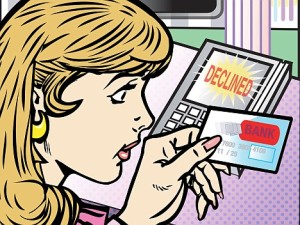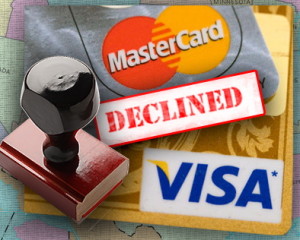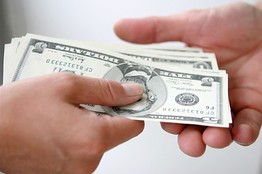We strive to be prepared for upcoming struggles and/or disasters — big and small. We talk about food, water, shelter, security, energy, and hygiene but we don’t seem to talk a lot about money.
 Recently a friend had her bank account frozen. Unbeknownst to her there had been a legal judgement against her and her bank account was to be garnished. She first became aware of this when she went to use a debit card and it was declined. She knew there was several thousand dollars in the account. When she checked her account status on line she found that her money was unavailable to her and the only explanation given was “We have been instructed by legal order to place a hold on these funds.”
Recently a friend had her bank account frozen. Unbeknownst to her there had been a legal judgement against her and her bank account was to be garnished. She first became aware of this when she went to use a debit card and it was declined. She knew there was several thousand dollars in the account. When she checked her account status on line she found that her money was unavailable to her and the only explanation given was “We have been instructed by legal order to place a hold on these funds.”
Sure in this day and age of credit card  cornucopia that many of us carry in our wallets, no big deal — just use another card. But that’s not the point, the point is HER money was unavailable to HER. No notice, no warning, nothing. Whether it was a legitimate or illegitimate reason doesn’t matter to her when she needed to access the money she had placed in the account from her paycheck. Hell, it could have even have been a mistake, but the money still wasn’t available.
cornucopia that many of us carry in our wallets, no big deal — just use another card. But that’s not the point, the point is HER money was unavailable to HER. No notice, no warning, nothing. Whether it was a legitimate or illegitimate reason doesn’t matter to her when she needed to access the money she had placed in the account from her paycheck. Hell, it could have even have been a mistake, but the money still wasn’t available.
I’ve written before that we know that we have basic needs, and that we need them everyday “…but most of us are dependent upon systems beyond our control to supply them for us. We also know that those systems have and will again fail. So if we know we need them why not plan ahead and have extra on hand…?”
Doesn’t this also apply to money we have in the banking system?
It could be a legal lien, a mistake, a bank failure, or even just a relatively long-term wide-spread power outage. Whatever. But if the money that you have in the bank isn’t available to you, it’s a big deal. Sure the problem will likely be resolved soon, within a few days or a week at most — can your family make it that long without access to your bank funds?
There will be those who argue that in a collapse money won’t even have value and won’t matter, and I agree that is true in a complete collapse. But we prepare for the most likely disasters first, and being unable to access your bank funds is more likely than an EMP going off and destroying all electronics and the electrical grid.
I’ve given some thought as to what our family can do (and in some situations already does) to prepare ourselves for this “disaster” / this short-term SHYF (shit-hits-YOUR-fan) situation:
 Have cash in a secure place at home. You’ve heard it before, but have enough cash readily on hand to cover your family’s expenses for at least one month, preferably three (with a goal of six).
Have cash in a secure place at home. You’ve heard it before, but have enough cash readily on hand to cover your family’s expenses for at least one month, preferably three (with a goal of six).- Carry cash in your wallet. An extra $100 will allow you to maneuver around most short-term situations and allow you to get back home.
- Carry more than one credit/debit card, and be sure they are from different financial institutions. Sometimes mistakes happen and credit cards get declined or just don’t work, if you need to use a card to pay have a back up just in case. (see Repetitive and Redundant x2)
- Consider having small individual accounts for both you and your spouse with some extra money. That way if only one of you is targeted by a legal lien, or a mistake, there will still be banking funds available.
Plan ahead. We know we need, and use, money on a daily basis. Have a back-up plan for what to do if your normal routine fails.



